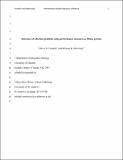Inference of selection gradients using performance measures as fitness proxies
Abstract
1. Selection coefficients, i.e., selection differentials and gradients, are useful for quantifying selection and for making comparisons across traits and organisms, because they appear in known equations for relating selection and genetic variation to one another and to evolutionary change. However, selection coefficients can only be estimated in organisms where traits and fitness (components) can be measured. This is probably a major contributor to taxonomic biases of selection studies. Aspects of organismal performance, i.e., quantities that are likely to be positively related to fitness components, such as body size, are sometimes used as proxies for fitness, i.e., used in place of fitness components in regression-based selection analysis. To date, little theory exists to inform empirical studies about whether such procedures may yield selection coefficients with known relationships to genetic variation and evolution. 2. We show that the conditions under which performance measures can be used as proxies for fitness are very limited. Such analyses require that the regression of fitness on the proxy is linear and goes through the origin. We illustrate how fitness proxies may be used in conjunction with information about the performance-fitness relationship, and clarify how this is different from substituting fitness proxies for fitness components in selection analyses. 3. We apply proxy-based and fitness component-based selection analysis to a system where traits, a performance measure (size; similar to proxies that are commonly used in place of fitness), and a more proximate fitness measure, are all available on the same set of individuals. We find that proxy-based selection gradients are poorly reflective of selection gradients estimated using fitness components, even when proxy-fitness relationships are quite strong and reasonably linear. 4. We discuss the implications for proxy-based selection analysis. We emphasise that measures of organismal performance, such as size, may in many cases provide useful information that can contribute to quantitative inferences about natural selection, and their use could allow quantitative inference about selection to be conducted in a wider range of taxa. However, such inferences require quantitative analysis of both trait-performance and performance-fitness relationships, rather than substitution of performance for measures of fitness or fitness components.
Citation
Franklin , O D & Morrissey , M B 2017 , ' Inference of selection gradients using performance measures as fitness proxies ' , Methods in Ecology and Evolution , vol. 8 , no. 6 , pp. 663-677 . https://doi.org/10.1111/2041-210X.12737
Publication
Methods in Ecology and Evolution
Status
Peer reviewed
ISSN
2041-210XType
Journal article
Description
O.D.F. is supported by the Natural Sciences and Engineering Research Council of Canada and the Madame Vigdís Finnbogadóttir Scholarship. M.B.M. is supported by a University Research Fellowship from the Royal Society (London).Collections
Items in the St Andrews Research Repository are protected by copyright, with all rights reserved, unless otherwise indicated.

